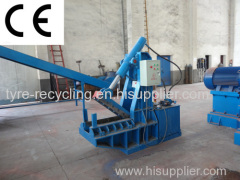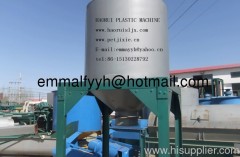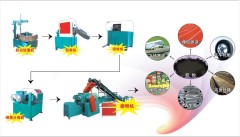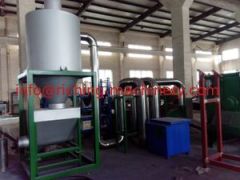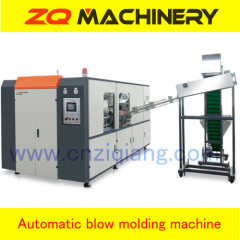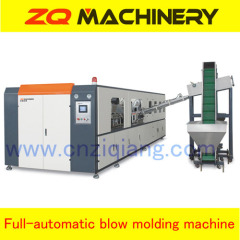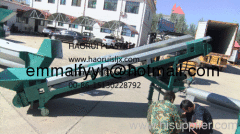

Waste PET Recycling Machine/Line
| Min. Order: | 1 Set/Sets |
|---|---|
| Payment Terms: | T/T, WU |
| Supply Ability: | 5 sets everyday |
| Place of Origin: | Hebei |
Company Profile
| Location: | Baoding, Hebei, China (Mainland) |
|---|---|
| Business Type: | Manufacturer, Trading Company, Service |
| Main Products: | Bottle Label Remover Machine, 50 Type Waste Plastic Recycling Drying Machine, 100 Type Car Tire Shredder/Crusher, 50 Type Plastic Pulverizer, 2000kg/h Efficient Waste Plastic Recycling Machine |
Product Detail
| Means of Transport: | Ocean, Land |
|---|---|
| Use: | Waste Plastic Crusher |
| Brand Name: | Haorui |
| Plastic type: | PP PE FILM |
| process: | crushing washing drying |
| capacity: | 300-2000kg/hr |
| advantage: | compact and durable |
| machine: | cost of plastic recycling machine |
| Production Capacity: | 5 sets everyday |
| Packing: | as your requirements |
| Delivery Date: | within 7 days |
Product Description
Product Description
Plastic crushing and washing recycling machine
This project belongs to wasted plastic recycling and rebirthing program.
It suits for varies of wasted plastic materials below.
Raw Material Range
1. Wasted Plastic Bottles, such as PET Bottles, PP/PE Bottles, and other plastic wasted bottles.
2. Wasted Plastic Films and Sheets, such as PET sheets, PP/PE Sheets, and other Wasted Plastic Sheets.
Also, the final products can suits for palstic rebirthing project.
1. Recycled bottle flakes can be used to the Polymer Fiber and plastic grains.
2. Recycled film pieces can be used to the pelletizing line.
3. Some recycled plastic material can be used to pipe extrusion line, such as PE/PET/PP pipes extrusion line.
Summary of the whole line.
There are four units in the whole line.
Feature:
1. High automation level, try best to reduce your cost on labor (especially for three shifts) and ensure high processing capacity: 300_2000kg/hr
2. Friendly control system (PLC integrated & separated control on each machine) and Touch screen panel, easy for operation, monitor and emergency stop.
3. All parts contacting with plastic material and water are made of high-quality 304 stainless steel; Ensure no second pollution to flakes.
Service System:
We will offer below items freely:
1. Technical supports
2. All-sided sales service.
3. Free assistance which is related to the plastic recycling and rebirthing.
4. Plant design and making budget for the whole palnt.
5. Previous on the the filed, and make economical analysis for all products.
6. Offer purchasing guide and to help clients to choose machines, also, make analysis on the targeted machines.
7. After-sales maintain and updated technical information for all clients.
8. Purchasing and Sales scrap plastic agent
This project belongs to wasted plastic recycling and rebirthing program.
It suits for varies of wasted plastic materials below.
Conveyor size:
Machine type | Machine name | Rubber belt thickness | Length(cm) | Width(cm) | Height(cm) | Motor(KW) | wheel proportion | Net weight(not including motor) | note |
60type | conveyor | 1cm | 400cm | 85cm | 50cm | 2.2KW | 30:1 | 250KG | machine can be customized |
60type | conveyor | 1cm | 600cm | 85cm | 50cm | 2.2KW | 30:1 | 275KG | Machine can be customized |
80type | conveyor | 1cm | 400cm | 105cm | 50cm | 2.2KW | 30:1 | 300KG | machine can be customized |
80type | conveyor | 1cm | 600cm | 105cm | 60cm | 2.2KW | 30:1 | 500KG | Machine can be customized |
100type | conveyor | 1cm | 800cm | 120cm | 60cm | 3KW | 30:1 | 800KG | Machine can be customized |
Raw Material Range
1. Wasted Plastic Bottles, such as PET Bottles, PP/PE Bottles, and other plastic wasted bottles.
2. Wasted Plastic Films and Sheets, such as PET sheets, PP/PE Sheets, and other Wasted Plastic Sheets.
Also, the final products can suits for palstic rebirthing project.
1. Recycled bottle flakes can be used to the Polymer Fiber and plastic grains.
2. Recycled film pieces can be used to the pelletizing line.
3. Some recycled plastic material can be used to pipe extrusion line, such as PE/PET/PP pipes extrusion line.
Summary of the whole line.
There are four units in the whole line.
Feature:
1. High automation level, try best to reduce your cost on labor (especially for three shifts) and ensure high processing capacity: 300_2000kg/hr
2. Friendly control system (PLC integrated & separated control on each machine) and Touch screen panel, easy for operation, monitor and emergency stop.
3. All parts contacting with plastic material and water are made of high-quality 304 stainless steel; Ensure no second pollution to flakes.
Service System:
We will offer below items freely:
1. Technical supports
2. All-sided sales service.
3. Free assistance which is related to the plastic recycling and rebirthing.
4. Plant design and making budget for the whole palnt.
5. Previous on the the filed, and make economical analysis for all products.
6. Offer purchasing guide and to help clients to choose machines, also, make analysis on the targeted machines.
7. After-sales maintain and updated technical information for all clients.
8. Purchasing and Sales scrap plastic agent
Conveyor size:
Machine type | Machine name | Rubber belt thickness | Length(cm) | Width(cm) | Height(cm) | Motor(KW) | wheel proportion | Net weight(not including motor) | note |
60type | conveyor | 1cm | 400cm | 85cm | 50cm | 2.2KW | 30:1 | 250KG | machine can be customized |
60type | conveyor | 1cm | 600cm | 85cm | 50cm | 2.2KW | 30:1 | 275KG | Machine can be customized |
80type | conveyor | 1cm | 400cm | 105cm | 50cm | 2.2KW | 30:1 | 300KG | machine can be customized |
80type | conveyor | 1cm | 600cm | 105cm | 60cm | 2.2KW | 30:1 | 500KG | Machine can be customized |
100type | conveyor | 1cm | 800cm | 120cm | 60cm | 3KW | 30:1 | 800KG | Machine can be customized |
Sometimes it seems like modern America is one colossal plastic palace. The versatile material is in our cars, toys, packaging, clothing, home goods, food utensils, medical devices and so much more. It is also littering our streets, clogging our waterways and choking marine life. Many plastics can be readily recycled, but how do consumers make sense of all the different types and rules?
Number 1 Plastics
PET or PETE (polyethylene terephthalate)
Found in: Soft drink, water and beer bottles; mouthwash bottles; peanut butter containers; salad dressing and vegetable oil containers; ovenable food trays.
Recycling: Picked up through most curbside recycling programs.
Recycled into: Polar fleece, fiber, tote bags, furniture, carpet, paneling, straps, (occasionally) new containers
PET or PETE (polyethylene terephthalate)
Found in: Soft drink, water and beer bottles; mouthwash bottles; peanut butter containers; salad dressing and vegetable oil containers; ovenable food trays.
Recycling: Picked up through most curbside recycling programs.
Recycled into: Polar fleece, fiber, tote bags, furniture, carpet, paneling, straps, (occasionally) new containers
PET plastic is the most common for single-use bottled beverages, because it is inexpensive, lightweight and easy to recycle. It poses low risk of leaching breakdown products. Recycling rates remain relatively low (around 20%), though the material is in high demand by remanufacturers


